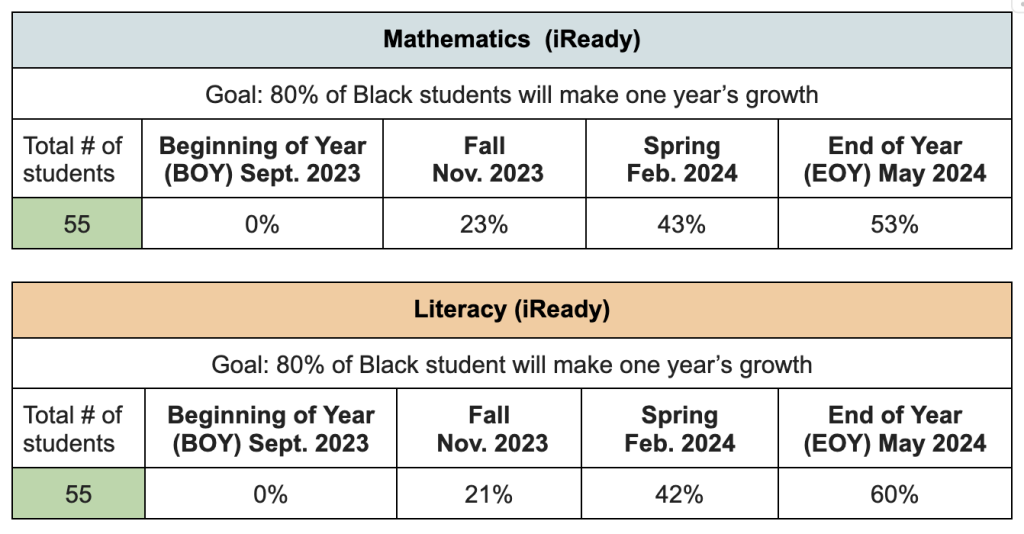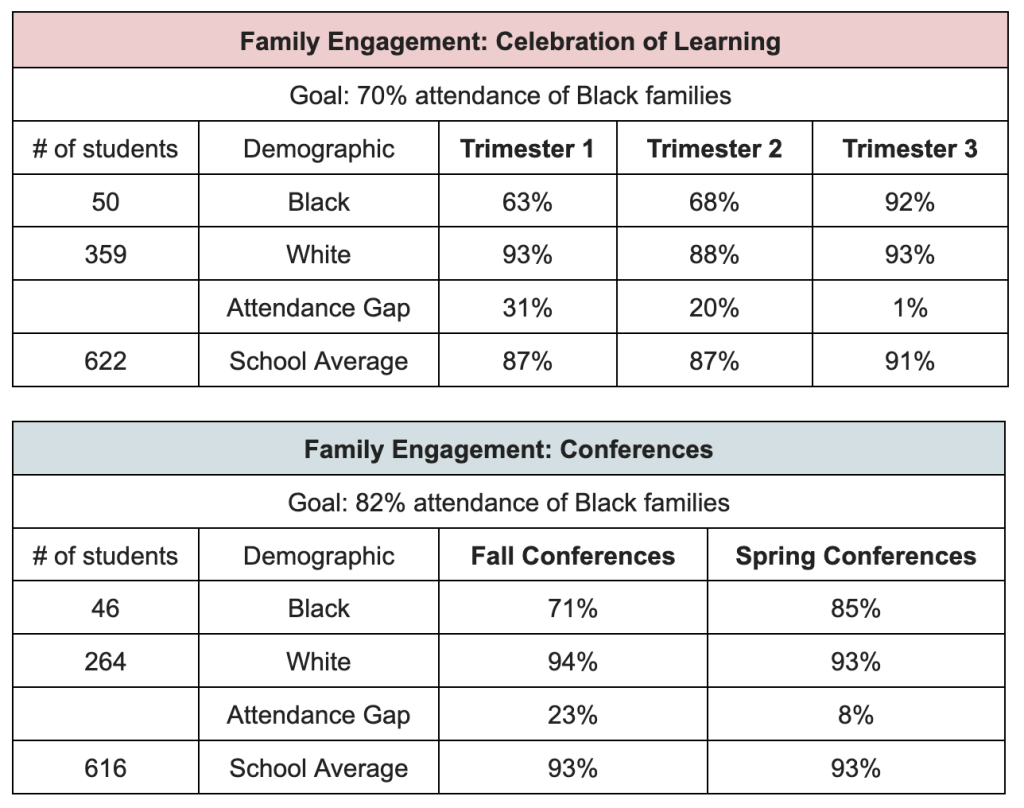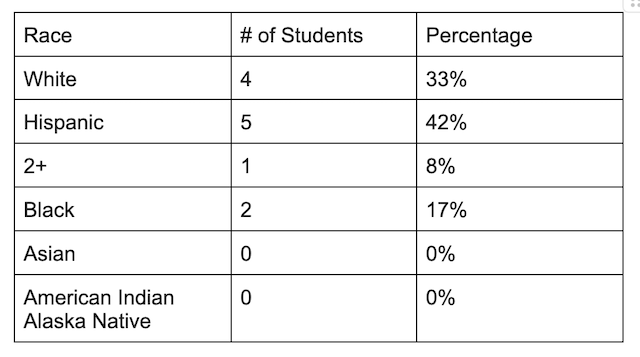
In 2019 The Denver school board passed a Black Excellence Resolution to improve how the district serves and celebrates Black students. DPS schools were asked to critically examine current inequitable systems and structures as well as policies and practices that were rooted in racism and had a negative impact on marginalized groups. Additionally, schools engaged in a deep dive into school and student-related data in order to create an action plan to better serve Black students and their families. We are dedicated to helping our Black students succeed at all levels and strongly believe that by supporting Black students, we learn lessons in how to support all students of color in our school. This year, our school created specific goals and next steps around family engagement of Black students and supporting academic growth.
Academic Growth
The achievement gap between Black and white students on the 2023 CMAS was 43% in math (a decrease of 20%) and 32% in literacy (an increase of 4%). Through focused data-driven instructional (DDI) meetings, teachers will focus on specific students within their classrooms to identify growth as compared to white students at least 4 times per year based on the iReady diagnostic. Action plans and next steps for instruction will be documented and tracked in MTSS trackers to ensure students are making adequate growth as related to the school-wide goal of 80% of all students making 1-years growth as determined by the iReady diagnostic.
We set an ambitious goal within our UIP to close the achievement gap between white and black students by 5%. Additionally, we have an unofficial goal of 80% of all students making their one-year growth as demonstrated by the iReady diagnostic. We did not make either of these goals as it relates to our black students. After reflecting on these goals, it is more appropriate that the achievement gap be a 3-year goal. Therefore, moving forward we should adjust our goal to decrease the achievement gap by 1-2% each year and remove the 80% growth goal as indicated below to align the work more closely with the UIP.

Family Engagement
At the beginning of the year, our data indicated that Black family attendance was significantly lower than the school average and in comparison to their White counterparts at Celebration of Learning and Family Conferences. Our goal was to increase Black family attendance to 70% for Celebration of Learning and 82% for Spring Family Conferences. The beginning-of-year to end-of-year attendance gap between White and Black families decreased by 30% for Celebration of Learning and 15% for Family Conferences. Through the diligent efforts of our school community, the family attendance goal was met and attendance gaps were significantly reduced.

The Family Engagement goal for the 24-25 school year will be to increase attendance at Black Family Night. Inspire will host two events, one in the Fall and one in the Spring. The purpose of having a Black Family Night is to foster a sense of community, celebrate diversity, promote cultural awareness, and strengthen relationships between the school and families of Black students. Nights will be structured to allow families time to connect with one another and provide an opportunity to provide feedback on community engagement.
Discipline Practices
Historically, Black and hispanic students are suspended at disproportionate rates. Black students in DPS make up 13% of the student population, yet the out-of-school suspension percentage is 28%. At Inspire Elementary, our 23-24 data shows that there were 20 In School Suspensions (ISS), composed of 12 students, of which 2 are Black. This represents <1% of our total student population.

During the 23-24 school year, there were 6 Out of School Suspension (OSS), composed of 2 students, of which 1 is Black. This is less than <1% of our student population.
Based on our 23-24 discipline data, Black students are not disproportionately represented in discipline responses. In general, Inspire Elementary’s SEL curriculum, classroom managed behaviors, conflict management tools and restorative practice approaches prevent suspensions.
While not specific to Black students, the analysis of the discipline data indicates a need to focus efforts to identify strategies to consider how students with IEPs/504s are supported in the general education classroom. We noticed of the hispanic students that received ISS, 3 out of 5 have Individualized Education Plans (IEPs). Therefore, the individual special education schedule for teachers will be adjusted to include additional push in support to classrooms. This will ensure that student accommodations are being met with fidelity, that support for classroom teachers in small group instructional practices are implemented, as well to push us towards a more inclusive model. In addition, considerations should be given to establish preventative measures to support students who may escalate or become dysregulated.
Beyond the Black Excellence Plan
While our Black Excellence Plan included goal setting and outcomes of academic growth and family engagement (Celebrations of Learning and Family Conferences), we also sought to engage students and families in ways that may not be measured or tracked. The intention was to create a student Black Alliance group in 3rd – 5th grades, which was not completed this year. Our Black female students were able to participate in the African American Young Ladies Summit (AAYLS), which is an organization that empowers and equips young women with tools they will need for a lifelong journey of achievement and success. In addition, a Black Family night was hosted to seek feedback from Black families and to solicit suggestions for the 24-25 school year.
Archive Summaries Regarding Black Excellence
Helpful Resources
What we can learn from a focus on our Black students is how to transfer our support to other groups of students. We look at data and the impact of academic and social emotional instruction for all our student groups. Our demographic data shows that we currently have less than 1% American Indian / Alaska Native, 5% Asian, 8% Black or African American, 12% Two or more races, 23% Hispanic, and 75% white. Our student population also consists of 6% ELL (English Language Learners), 6% Special Education students, 21% Free Reduced Lunch students.
During the 2021-2022 school year, a small cohort of staff (two Administrators and three members of the Instructional Leadership Team) completed the Equity Experience. The Equity Experience is the result of what is outlined in the Black Excellence Resolution driven by the Board of Education, which calls for “training all members of Team DPS in implicit bias and culturally responsive education on an ongoing basis.” This cohort of staff then facilitated turnkey professional development for the rest of the staff during PD Days during the school year.
During the 2022-2023 school year, the remainder of our instructional staff (teachers, interventionists, ELD) and support staff (Counselor, Social Worker, Front Office) completed the Equity Experience module. After modules were completed, turnkey professional development sessions were facilitated during PD days. In addition, administration completed the second series of DPS’ Equity Modules. This second year of equity PD was intended to strengthen and build upon the work that was completed during the prior year.
During the 2023-2024 school year, staff continued with equity PD sessions during Inspire Days. Sessions were based on Culturally Responsive Teaching & The Brain by Zaretta Hammond with three parts:
Looking ahead to the 2024-2025 school year, we will be engaging in The Consciously Unbiased Educator by Huda Essa.
Helpful Resources